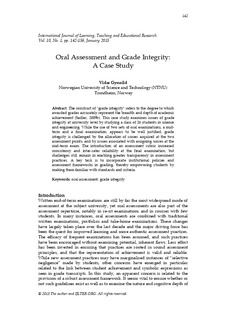Oral Assessment and Grade Integrity: A Case Study
Journal article, Peer reviewed
Published version
Permanent lenke
http://hdl.handle.net/11250/2628099Utgivelsesdato
2015Metadata
Vis full innførselSamlinger
- Institutt for lærerutdanning [3819]
- Publikasjoner fra CRIStin - NTNU [38525]
Originalversjon
International Journal of Learning, Teaching and Educational Research (ILJTER). 2015, 10 (1), 142-157.Sammendrag
The construct of "grade integrity" refers to the degree to which awarded grades accurately represent the breadth and depth of academic achievement (Sadler, 2009b). This case study examines issues of grade integrity at university level by studying a class of 26 students in science and engineering in Norway. While the use of two sets of oral examinations, a mid-term and a final examination, appears to be well justified, grade integrity is challenged by the allocation of scores acquired at the two assessment points, and by issues associated with assigning scores at the mid-term exam. The introduction of an assessment rubric increased consistency and inter-rater reliability at the final examination, but challenges still remain in enabling greater transparency in assessment practices. A key task is to incorporate institutional policies and assessment frameworks in grading, thereby empowering students by making them familiar with standards and criteria.

